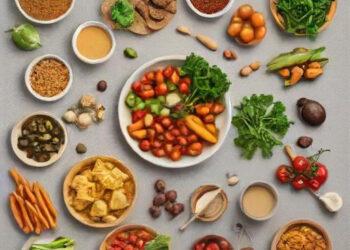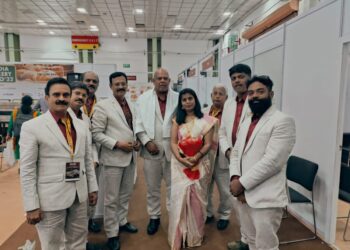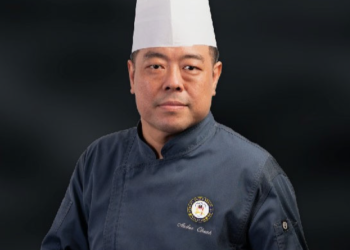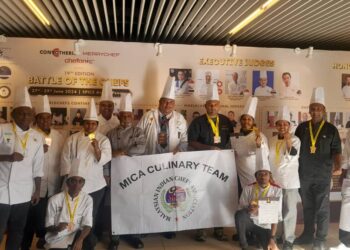By Chokkapan S (chock@imaws.org)
Kozhikode: Off the Malabar coast, a stone’s throw away from the Kozhikode beach stands a culinary realm spanning eight memorable decades and multiple generations of patrons. Paragon Restaurant, befitting its name, is an epitome of delicious food and evokes nostalgia in many an old-timer. It’s not just the old guard, though. “We have hordes of youngsters returning to Paragon after several years just to relive sheer memories of eating out with their parents during their childhood,” iterates Sumesh Govind, Managing Director of the Paragon Group of Restaurants.

The Beginning
Being a third-generation entrepreneur, Mr Govind himself has some fond recollections of his childhood and how his predecessors used to run the show at the City of Spices. “My grandfather and father were genuine, righteous and hardworking gentlemen. After my father’s demise, my mom took over the reins of the business and passed on the legacy to me. It was my destiny to take the family pride forward. My granddad and dad’s blessings are integral in my growing the business for the last three decades,” explains Mr Govind on how easy it was to sustain the business for such a long period.
For the uninitiated, Paragon’s long journey began with the maiden step of one Govindan Panhikeyil and his dear son, P.M. Valsan in 1939. It was a modest baking set-up – Paragon Baking Company – in then Calicut that would metamorphose into a behemoth chain of beloved restaurants in the subsequent decades. The unexpected passing of Mr Valsan also had destiny’s hand in it. It threw the second-generation baton onto the hands of his wife, Saraswathy, who had an indomitable spirit to carry on the family business.
Philosophically Yours
Mr Govind is more a man of philosophical leanings than business fundas. He says that his early goal was to become a theoretical philosopher. “My passion and first love is philosophy, not business. When I was 25, I was enchanted by thinkers like Osho and Jiddu Krishnamurti, and dabbled in it. It is a completely different ballgame from the business. That said, to walk the talk – practise what we preach – is difficult in philosophy,” he reasons.

Then, what made him take the plunge into the world of business? “It can’t get closer to ground reality than to be in the food business (restaurant),” pat comes Mr Govind’s reply. “Food is a basic necessity and day-to-day affairs in the industry make one put a lot of philosophical theories into practice.”
His vision is to have the backs of his family, friends and staff members, and provide for them in every way. “I want to be a leader and mentor to them. My business is an opportunity for me to do it as a sadhana (spiritual practice) and practise my theories. Only in this case will our customers feel the results of our hard work and dedication.”
Consistent Innovation
Can he single out a particular aspect of his business as its USP? “Certainly! It would be innovation. We continuously innovate our menu, management style, ambiance, etc. There is a creative process that drives everything, which is dynamic. The static part comes from the consistency in our taste and operations,” replies Mr. Govind.
Paragon is renowned and recommended for its Malabar and other coastal cuisines. It makes one wonder how the restaurant management is maintaining consistency in terms of its recipes’ quality, taste and variety. Even more so if we consider that every generation’s meal preferences swing so wildly from those of its predecessor – as with every other generational trend? “Progress is to change without losing stability,” states Mr Govind matter-of-factly.
He adds that they inherently have two types of dishes: 1. Classics and 2. Trends. “While the classics remain the same and retain their consistency over time, trends naturally depend on generational preferences, as we keep our eyes and ears open while doing our research and development. The idea is to balance both without compromising on one.”
The Emotional Quotient
There are some recipes of Paragon that have remained the same over the last 80 years and counting. “Our chicken biryani, fish moily, prawns dry/fry, chilli chicken, mutton stew, veg stew and appam have been quite consistent all these years. That’s why the experience we assure at Paragon is an emotion by itself.” So, what’s their secret sauce? “It’s passion and common sense – the latter being a rare commodity these days,” quips Mr Govind.
Kozhikode is a humble Tier-2 city, and not exactly Kochi or Thiruvananthapuram when it comes to the demography. One is curious to know whether the city’s rich heritage and cultural identity helped shape Paragon’s DNA. “That we trace our origins back to the Malabar belt is a huge advantage, because it is a melting pot of Arab, English, Portuguese and French influences. It helps us cater to an international palate. We serve a pan-world cuisine in a way,” Mr Govind explains, adding, “My friendly nature and attitude may have rubbed off from the locals of Kozhikode. Our people have hospitality in their DNA.”
Quality Matters
The walk-ins at Paragon plummeted during the Corona spread for over three months. “Yet, we maintained our standards and hygiene through trained employees, thereby assuring our customers of all safety guidelines.”
Currently, Paragon has four group concerns: Salkara, M Grill and Brown Town Bakery & Cafe and the Paragon Outdoor Catering Company. It also has a presence in the United Arab Emirates through its Dubai outlet. “We are not looking at expanding to more geographies as of now. Our focus is more about quality than brand building or valuation. Every customer that walks in to our outlets should be touched by our food and service. I will be happy if I make every lady in the vicinity stop cooking,” guffaws Mr Govind.
ADVERTISEMENT: This article is powered by EssEmm Corporation. (www.essemmindia.com) . Lead by Mr Satish Nair, We are leaders in the field of Industrial Catering Automation, Food Processing, Software Engineering & Support Services.







